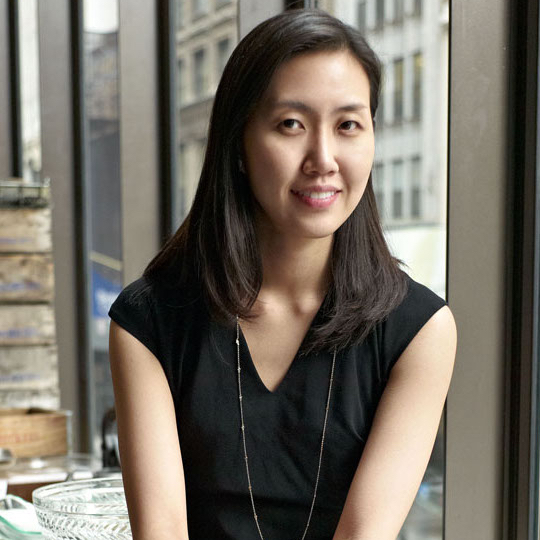By Harah Chon
What is design? Most are familiar with the use of this term as a noun, in which design refers to finished objects, forms, services, and solutions. Design is often used as an adjective to describe aesthetic qualities or the utility and function of things. As a pronoun, however, design emphasises the networks or systems involved in the industry as a whole. But what sets design apart from all other human activities is in its use as a verb, denoting its many approaches, perspectives, actions, processes, ideations, interpretations and implementations. Design is a way of looking at, framing, thinking, improving upon, and changing our built environment. In this way, design involves everything and can be seen everywhere.
 Dr Harah Chon; photo by Azmi Danuri
Dr Harah Chon; photo by Azmi Danuri
Design: Always Evolving
The roots of design can be traced to the Industrial Revolution, when developments in assembly line production and mass manufacturing supported the creation of products and sharing of information. Throughout the twentieth century, design’s focus shifted from systematic processes for production, to an emphasis on appearances and form, and to complex functions and interactions. These transitions have led to the formalisation of the design discipline as it continually evolves to develop its own concepts, theories and knowledge. The traditional design professions—industrial, fashion, graphic, interaction, spatial and urban—emphasise the process of probing, sketching, thinking, making, testing, reflecting and modifying. Design relies on knowledge to frame problem contexts, and the “Four Orders of Design” outline spaces for rethinking and reconceiving the nature of design from symbols and things, to action and thought. Where design was once concerned with communicating symbols and images to producing objects and things, we have shifted into the designing of relationships and systems. We now raise a more humanistic concern at the core of social life, questioning how design can better relate to people and their interactions with other people. This paradigm shift concerns the role of meaning in design —as both a cultural and contextual construct, as well as its implications for designing meaningfully.
The Citizen Designer
In recent years, design has moved beyond its traditional boundaries of professional practice towards the human-centred approaches of design thinking and concept of the citizen designer. The intuitive ability and knowledge of designers, as problem-solvers, has been translated into what we now refer to as the design-thinking process. This methodology provides an holistic framework that allows non-designers to “think as designers” and understand, contextualise and address complex problem spaces. Design thinking brings the needs of people to the forefront of achieving creative and effective solutions, echoed by the call for professional designers to become citizen designers who design for social impact. The diffusion of design knowledge, from professional practice to design thinking, has broadened the scope of socially responsible design through increased collaboration and co-creation.
Social Design for Sustainable Change
Social design begins with the mindfulness of designers to consider the role and responsibility of promoting positive cultural and social change. I was first introduced to this concept during a lecture series by Professor Ezio Manzini in 2012; Manzini, an advocate for utilising design as a driver of sustainable change, outlined the opportunity for design to set initiatives that serve the common good through socially valuable ways. His ideas left a lasting impression, and I often refer to those lecture notes as a reminder that being a designer is to acknowledge the privileged position of influence, from the smallest of ideas to enterprising radical change. This has formed my personal philosophy as a designer and researcher through examining issues of preserving intangible culture and heritage, cultural sustainability, knowledge transference and collaborative design. The emerging themes of social design are issues affecting everyday life, from individual to community problems. At LASALLE College of the Arts, we have seen students exploring issues across social and cultural dimensions to not only use design as an outcome-driven activity, but also as future-oriented processes deeply rooted in research.
“Unleashed”
By Meher Kalwani, BA(Hons) Fashion Design & Textiles, School of Fashion, LASALLE College of the Arts
“Unleashed” explores the concept of polycystic ovary syndrome (PCOS) and its effects on the female body, so as to build awareness and empathy for the ongoing pain women face with regards to infertility. Textile design is used to celebrate and empower women by redefining the aesthetics of femininity, using fashion to mediate the emotional and psychological characteristics of the disease.
Textile Experimentation—Pleats and Digital Print (Meher Kalwani)
“Agents of Change: Fashion & Social Enterprises”
By Rebecca Eu, BA(Hons) Fashion Media & Industries, School of Fashion, LASALLE College of the Arts
This project reviews how the fashion system can adopt sustainable business models to communicate the stories and issues of social injustice and women’s rights to fashion consumers. As a social enterprise, this research uses design to equip and support former victims of sex trafficking with necessary skills and education to gain financial independence.
Former Victims of Sex Trafficking, aged 15–25 (Rebecca Eu)
“Empowering Rural Women through Natural Building and Permaculture Design Practices”
By Batul Pitha Wala, MA Design, School of Design Communication, LASALLE College of the Arts
Gender equality is a global issue that affects both the urban and rural structures of society. This project examines the living conditions of women in Gudiya Village in Indore, India, where women are the primary caretakers of the land and all infrastructure development. The research identified key areas for design intervention to develop co-creative initiatives to empower women with design skills and knowledge.
Co-creation of a Biomass Cooking Stove (Batul Pitha Wala)
Design as Social Commentary
Singapore is a designed city, being a nation that has embraced the role of design to achieve economic, technological, and infrastructural growth and advancement. With a growing concern for design, there are many ways in which designers can provide new perspectives and points-of-view to address issues concerning lifestyle and well-being, community-building and cultural development. Research projects from LASALLE’s MA Design Programme examine issues of user perception and sustainable consumption, wayfinding and cultural place-making, as well as traditional crafts and intangible heritage.
“Food Waste: An Inquiry into Singapore’s Cosmetically Filtered Produce”
By Muhammad Andri Bin Afandi, MA Design, School of Design Communication, LASALLE College of the Arts
Food waste is growing phenomenon in the developed world. This project examines the cosmetic filtering process of food, where wastage takes place due to aesthetic requirements. Reconstructing food waste as a design artefact, this research explores “ugly food” across the processes of edibility, usability, form, compound, structure, taste, texture and sensorial experience.
Observational Study of Food Donation, Free Food for All (Andri Afandi)
“This is My Toa Payoh: A Placemaking Project based on Memories and Stories of Its People”
By Nur Syairah Bte Abdul Malek, MA Design, School of Design Communication, LASALLE College of the Arts
This project examines how spaces can be explored to uncover the memories and stories of its inhabitants. Against the rapid urban development of Singapore, it studies how designing a wayfinding system can facilitate cultural place-making to articulate the intrinsic intentions, values and meanings of space.
The Chronicles of Toa Payoh (Nur Syairah)
“Deepening Crafts: Insights to the Life and Death of Local Crafts”
By Benson Lee, MA Design, School of Design Communication, LASALLE College of the Arts
Singapore’s rapid progression towards modernisation has led to the loss of cultural practices and traditional methods of making. This project reviews the local crafts of Singapore, focusing on how memory and nostalgia can be manifested through contemporary design practice, and result in cultural preservation and conservation.
Local Artisan Crafts (Benson Lee)
Design is synonymous with change, developing resilience in its acceptance of failure to continually evolve through recursive and discursive iterations. It produces robustness in not only appropriating effective solutions to problem spaces, but also in identifying best practices and processes for new methods of assessing, experimenting, testing and improving. The current positioning of design, as a socially inclusive and responsible system, requires more interdisciplinary knowledge to deal with the growing complexity and ambiguity of societal problems. Whether thought of as an adjective, pronoun or verb, design is for everyone. It recognises the need for more participation from neighbouring disciplines and communities of practice to discover new models, develop new systems, and reformulate the social role of who designs.
Photos and images in this article courtesy of Dr Harah Chon.
 |
Harah Chon is a Korean-American design practitioner, researcher and educator. She began her professional career in New York as a fashion designer at Ralph Lauren before pursuing postgraduate studies in Hong Kong. Dr Chon holds a PhD in Design Epistemology, through which she examined the ontological structures of knowledge representation to produce a culture-based taxonomy of design knowledge. Her current research activities focus on design theory and philosophy across the themes of collaborative design frameworks, disruptive approaches to interdisciplinary design, intangible culture and heritage, and knowledge transference. She advocates the furthering of discourses on design and cultural sustainability, social design and design knowledge. She can be reached at harah.chon@lasalle.edu.sg |








Comments